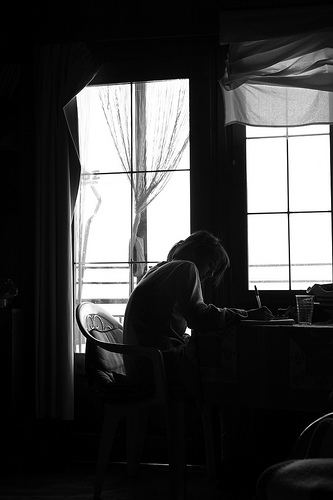
Image from Flickr by yiorgos georgiou
Last week was scary. Not because a 6-foot tall Grim Reaper jumped from the shadows of my neighbor’s porch and hissed at my children (that was actually pretty great), but because I experienced a serious case of writer’s block. And I’m under contract.
When I received my initial round of edits on The Fourth Wall, I was ecstatic. This is the part, I’d been told, that hurts the most. These are the “big picture” changes, when you have to delete major characters you’ve invested years in, when your favorite scenes are gutted, when you’re asked to rewrite an entire novel in a different point of view (my worst fear).
None of that happened. My editorial letter had lots of suggestions, but the big ones involved adding to the book. This makes sense; I do write flash fiction, after all. Everything I’ve published thus far has been short; most of it was written to a word count: 500 words, 1,000 words, 250 words. When I sent my novel off to WiDo Publishing, it was a trim 45,000 words, and even that seemed indulgent.
Wow, so I get to write more, I thought. No problem!
Here’s the problem. I wrote The Fourth Wall three years ago. Since then, I’ve tinkered with it: plugged up holes, rewritten dialogue, added depth to characters, extended scenes . . . but I couldn’t remember when I’d last added new scenes. Where would they go?
I scrolled up and down the manuscript, trying to see what could be split apart to make room for new material. I typed pages of notes. But I couldn’t see. And that worried me, because without knowing what to write and where to put what I did write, I wasn’t excited about writing at all.
I was stuck.
Time to try something else. On Sunday, I printed a hard copy of my novel, spread out the pages, and began writing notes by hand. I crossed out sentences and scribbled in margins, and soon the only difficult part was keeping up with the ideas.
Somehow, the physical act of holding paper and writing with an actual pen made me feel more in control. And it’s easier to slash through paragraphs on a page, because it doesn’t feel permanent. Yeah, you can create a new document and know your old one is intact somewhere on the computer, but it’s still hard highlighting a paragraph, hitting “delete” and watching it disappear.
Since Sunday, I’ve added 3,000 words to my novel, and more importantly, I’m excited about the new material. It feels like it did when I was writing the first draft; I’m so fully immersed in my characters’ world that I’m jotting notes in bed, at the dinner table—stealing any moment I can. I’ve been waking up at four in the morning, for God’s sake, and I’m not one to emerge from under the covers until the third snooze alarm.
This is when being a writer pays off. When you can reclaim the pure joy of creating something, when you stop and realize, “my job is making up a fictional world and filling it with make-believe people, and dammit, that’s supposed to be fun.”
And it is. In fact, I think I’ll go back to work now. You’ll overlook any typos in this post, won’t you? I’ve been up since four.













I love that you are working at something you have always wanted. I am so excited for you. This blog is beautiful and you inspire me. Thank you! Keep up the good work. You’re on your way! 🙂
Thanks Elizabeth! 🙂
I’m with you about pen and paper. I like to “feel” it too. Too many times I’ve hit that “delete” key and yelled “Shit! Shit! Shit!” to no avail. It’s gone and it’s never coming back. Not to reference you get older, but I get up at 4 am most of the time these days and I’m not writing a book. I’m so excited for you. Love you.
Hahaha, yup, I’m sure I’ve said those very words 😉 Thanks for the comment, Oma!